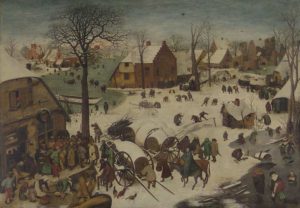In two verses, taken from Peter’s first letter, there is a reference to the Church under construction, to those who are building it and to the mentality in the way of building.

You also, like living stones, are being built into a spiritual house to be a holy priesthood, offering spiritual sacrifices acceptable to God through Jesus Christ.
But you are a chosen people, a royal priesthood, a holy nation, God’s special possession, that you may declare the praises of him who called you out of darkness into his wonderful light.
(1Peter 2:5, 2:9 NIV)
In chapter 2, v. 5 the apostle speaks of the construction of a spiritual temple, … and also of those who are building: a group of priests consecrated to God, charged with offering him spiritual sacrifices.
He clarifies these words in v.9: the spiritual temple that is being built is the Church, God’s people of the New Testament. The Church, the Temple of God, is formed by each living stone, that is, by each born-again Christian who has placed all his trust in the Lord (John 1:11-12).
Building? Who can do that?
Who are the builders of this spiritual temple, of this faith community?
They are all Christians. It is the whole Church as a whole. They are all those who have been liberated by Christ to become God’s people.
The apostle Peter, under the inspiration of the Spirit, designates them as a community of priest-kings. God gives them the responsibility and function of celebrating the works of God.
How? By living an authentic Christian life, by witnessing that this Christian life brings hope, eternal hope.
Building? To what purpose?
“Build yourselves into a spiritual house”
 Let us build ourselves, let us build up ourselves: let us put in place all the elements that structure our life of faith with God, and also promote our relationship with others.
Let us build ourselves, let us build up ourselves: let us put in place all the elements that structure our life of faith with God, and also promote our relationship with others.
Praying, reading and meditating the Bible, alone, in small groups and in the community.
And also the witness of the daily life, of the explained Word, fellowship, mutual help and assistance, etc.
On the basis of the examples given in the Bible and according to the needs that arise, or that we try to know.
The Church is first and foremost God’s plan.
She will be present before him as a radiant church, without stain or wrinkle or any other blemish, but holy and blameless. (Ephesians 5:27 NIV)
The Church according to the model of the New Testament, the Church willed by Christ, was never built at random.
The history of the Church over the centuries and the current events present different models: that of the established churches, Catholic and Protestant, to which one is automatically integrated, without taking a personal position, and that of sects, products of the will of a man or of a group.
The Church in conformity with the New Testament is not a group of people who have left to circumstances, to the will of men and even to the sole desire of each person the ability to live together.
It is therefore not a juxtaposition of free spirits, who believe themselves free to participate one day in the life of one community, another day in another, and the 3rd day to invent their own Church as they conceive her.
The community is formed by a conscious and voluntary construction in continuity, not by passive adherence.
Our commitment as Christians makes us responsible before God and before others. May our personal and community life always conform to the model of biblical teaching, built on the foundation of the apostles and prophets, with Christ Jesus himself as the chief cornerstone. (Ephesians 2:20 NIV)
The life and growth of the Community will not be possible without us. Let us become aware of our responsibility and our possibilities for action…. to take an active part in it.
The goal is to build, to edify, to move forward. It is not a question of passively waiting for it to happen alone… or for others to do it for us…
Building, how to do it? With what mentality to do it?
Peter says it well: we Christians are a chosen people, a community of priest-kings. In other versions: a royal priesthood, i.e. the King’s priests. This is a double function.
First the function of priests.
The function of a priest is to offer sacrifices to God. The priest is also a mediator, that is, an intermediary between God and men. In the Old Testament, God had entrusted this to specially chosen men.
Since Pentecost, God has given it to the believers. We believers are called to offer your bodies as a living sacrifice, holy and pleasing to God– this is your true and proper worship. (Romans 12:1 NIV)
Thus, we remain conscious that our body is the Temple of the Holy Spirit, the dwelling place of God… and we live accordingly.
We are also responsible for proclaiming the message of reconciliation (2 Corinthians 5:20).
It is the reconciliation of the sinner with God, made possible through Christ’s work of atonement. Through His death on the cross and His resurrection, He paid for our sins in our place.
How can we talk about this reconciliation?
Let us tell how we experienced it, how God transformed our lives. Let us simply explain what was our life before, without God, obscured by sin and life after, with God in the light.
Let us bring others forward in the longing for a Christian life that honours God, that respects and loves others… And let us always accompany our witness with prayer.
Then the royal function
The amazing thing is that Peter speaks neither of ruling nor of governing. Yet this is what is expected of a king or of a political leader. Be carefull, the point here is the responsibility of the function, not the glory of the title.
In fact, in the Church, no Christian can reign, dominate over others alone.
If he has been called to exercise authority, it is always within and under the control of the discipline and communion of the Church. That is why the expression is plural. It is a community function; it involves more responsibility than glory.
It is not here, on this earth, during the time of our Christian life, that we will reign, in the human way, even if we claim to do so with God.
Here on earth, the Christian, as a king, has the function of being a servant of God and of others.
The kings of the Gentiles lord it over them; and those who exercise authority over them call themselves Benefactors. But you are not to be like that. Instead, the greatest among you should be like the youngest, and the one who rules like the one who serves.
Luke 22:25-26 NIV
In testimony, too, the obstacle to avoid is taking the role of a king, ….of a dominator who knows everything when faced with ignorant people
Even if our interlocutor does not know much about the Christian faith, let us rely on what little he knows to move him forward, … by eventually correcting errors and inaccuracies.
It is by speaking the truth…(what I know to be right according to the Bible) in love...(the way of communicating it) that we will grow to become in every respect the mature body of him who is the head, that is, Christ. (Ephesians 4:15 NIV)
In each of our communities, therefore, let us learn to be aware of our responsibility as Christians.
We know this:
We are not only servants but also friends of God. We have received from Christ all that He has learned from his Father. And we know that He has chosen us to bear fruit that will last. John 15:15-16
Let’s not wait for a few responsible people to do everything while the other members of the community play the role of parishioners, of useless members on the benches. Although not all have specific functions in proclaiming the Word, each has responsibilities in witnessing and serving others.
Let us remain conscious, grateful for this openness for both men and women to all responsibilities. And let us be attentive to the mentality in which we could specify even better our service for God, in the Church, in favor of others.
C. Streng



